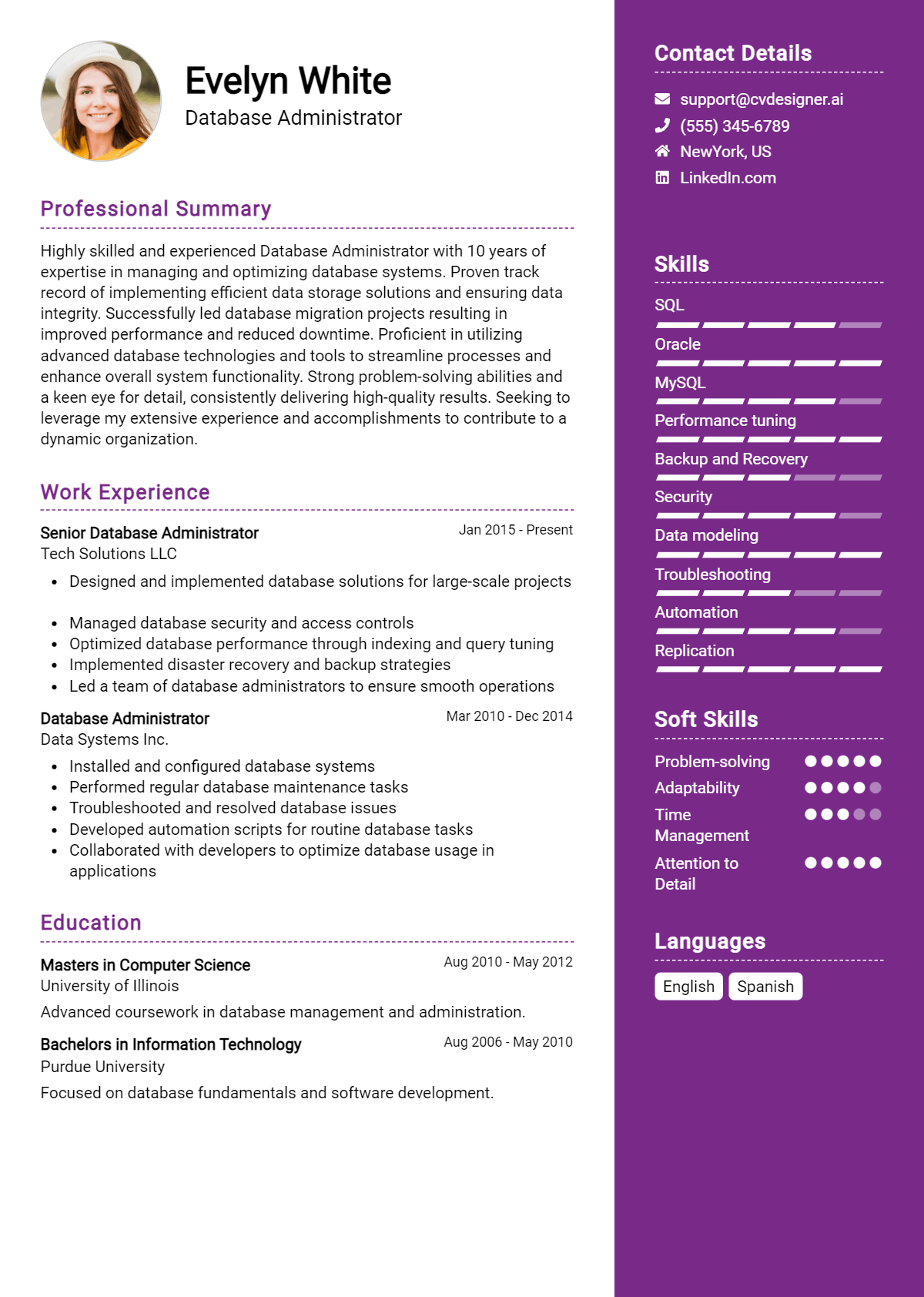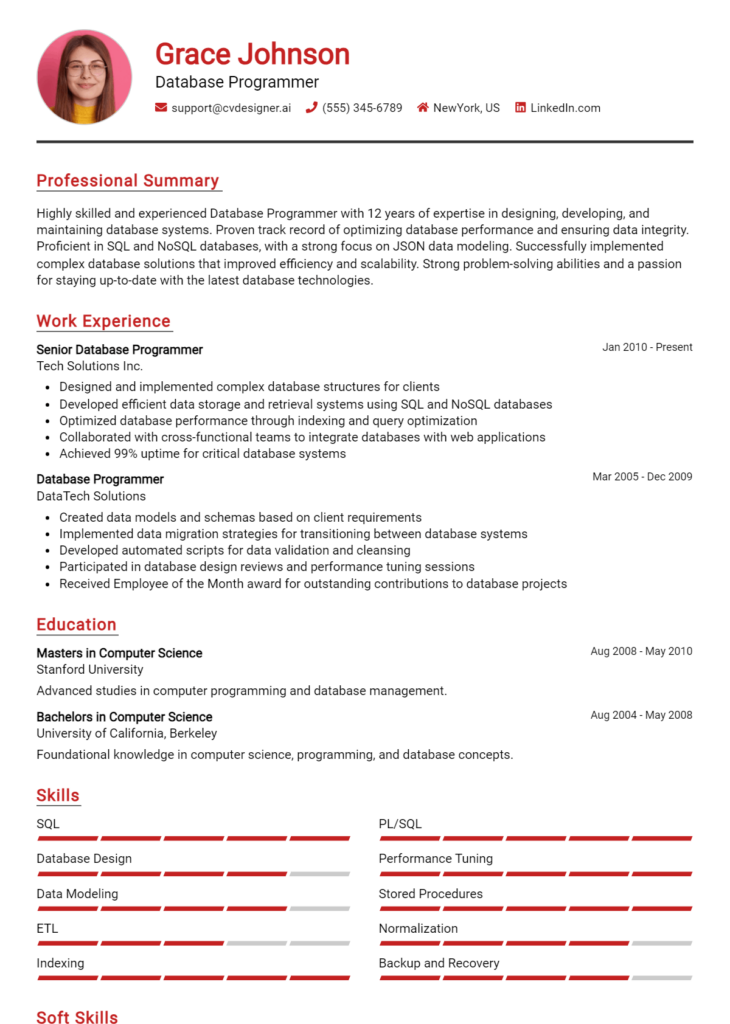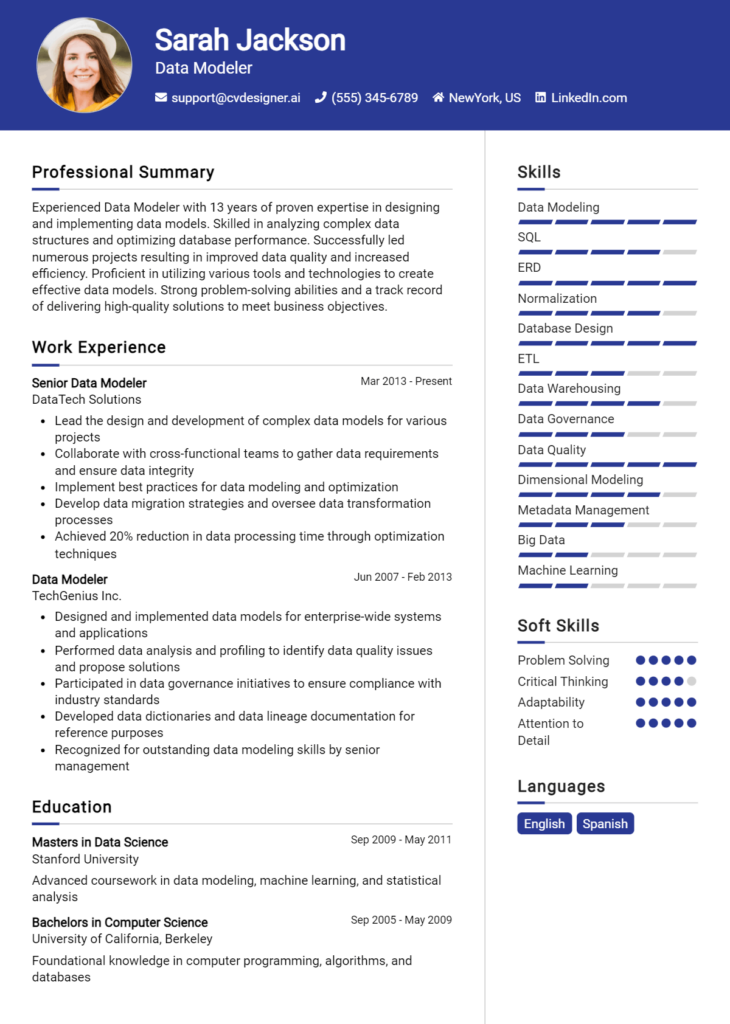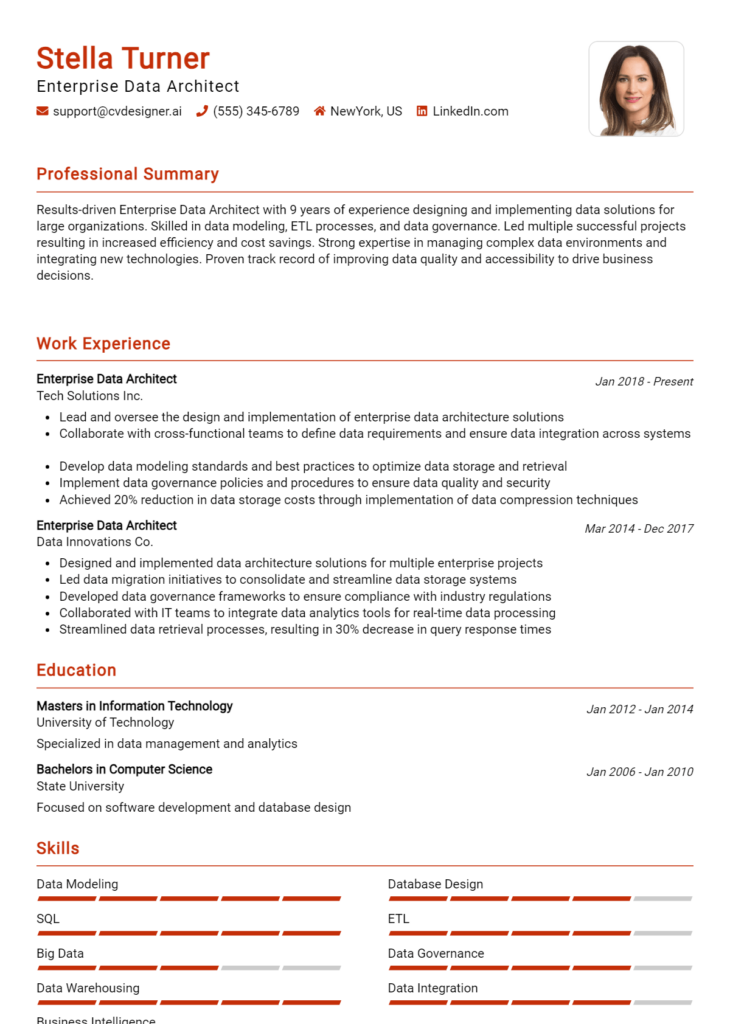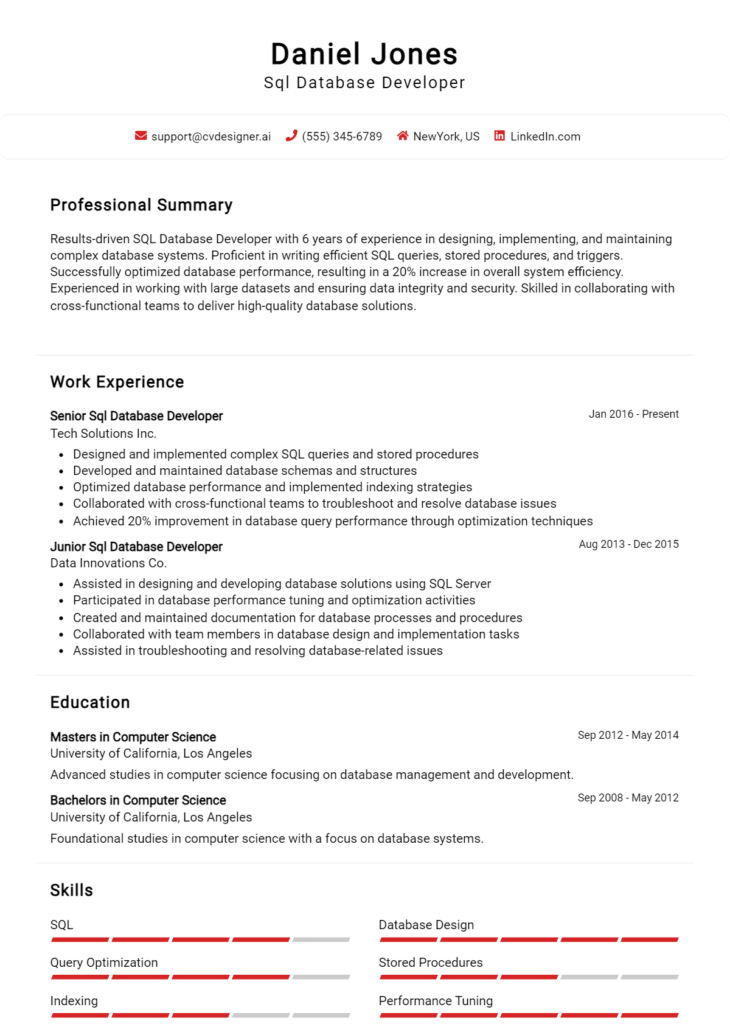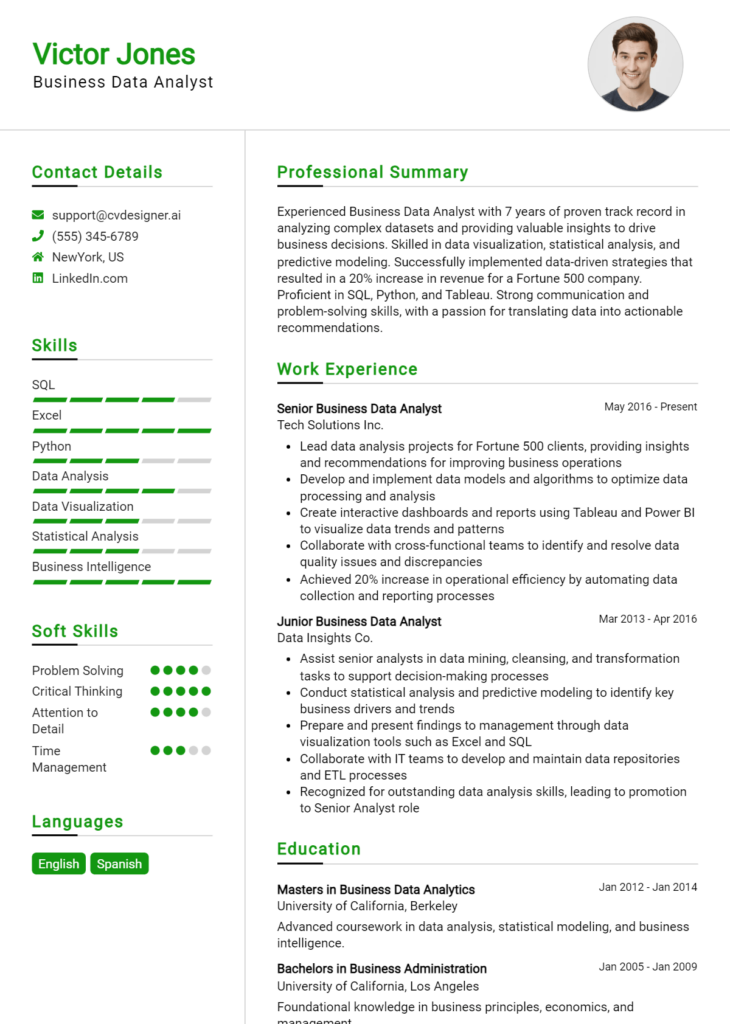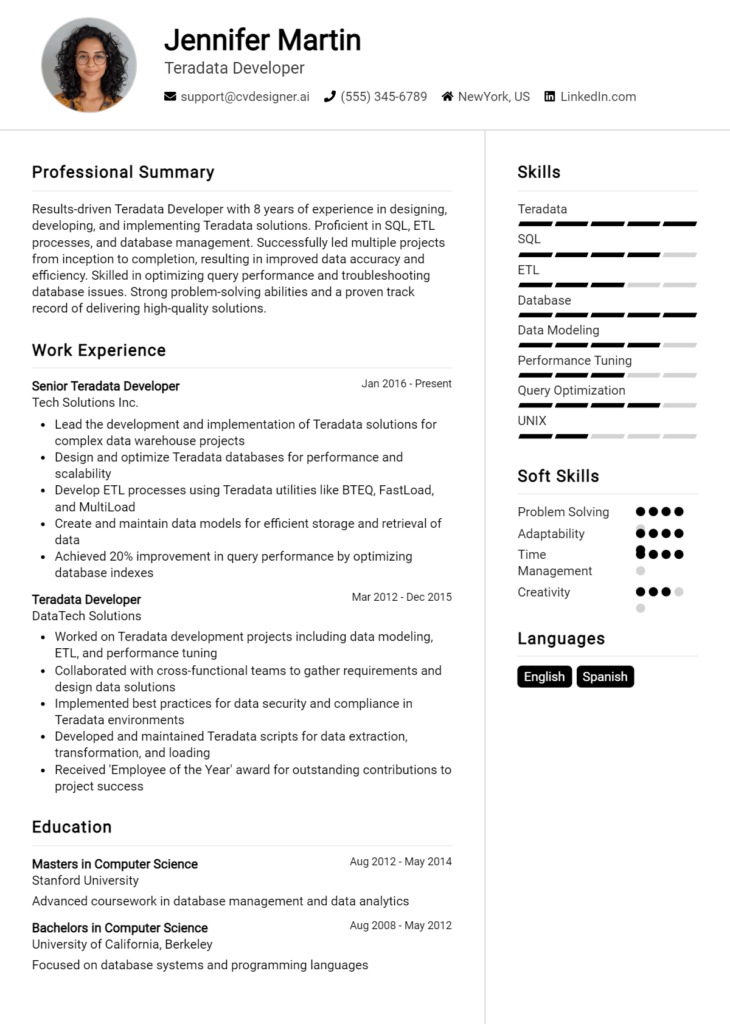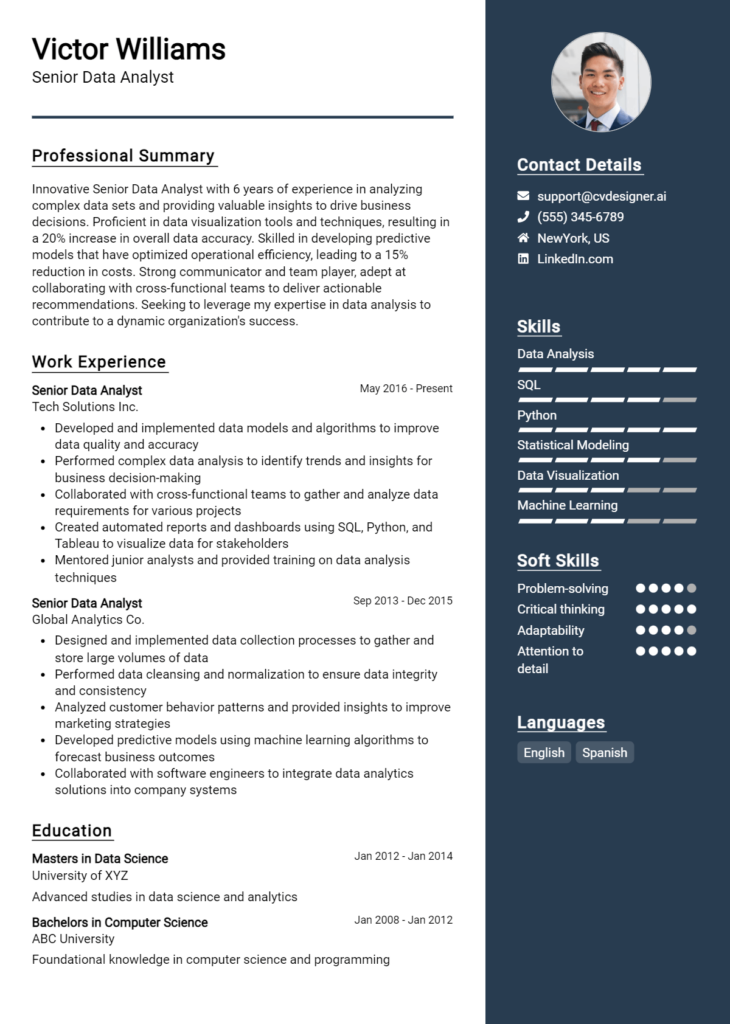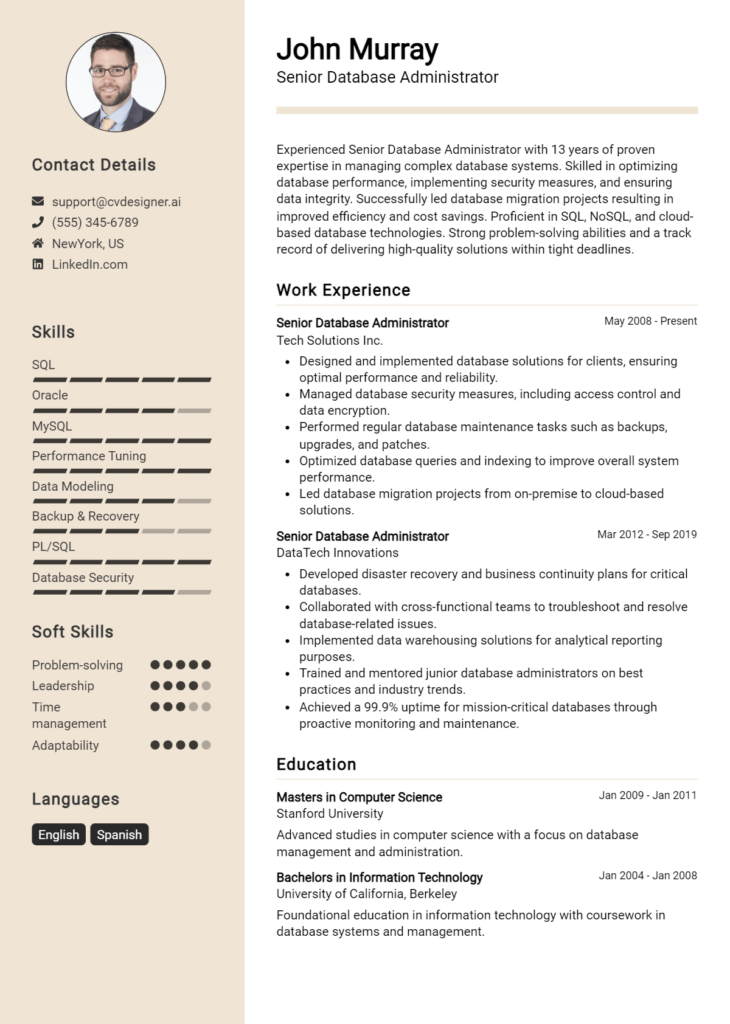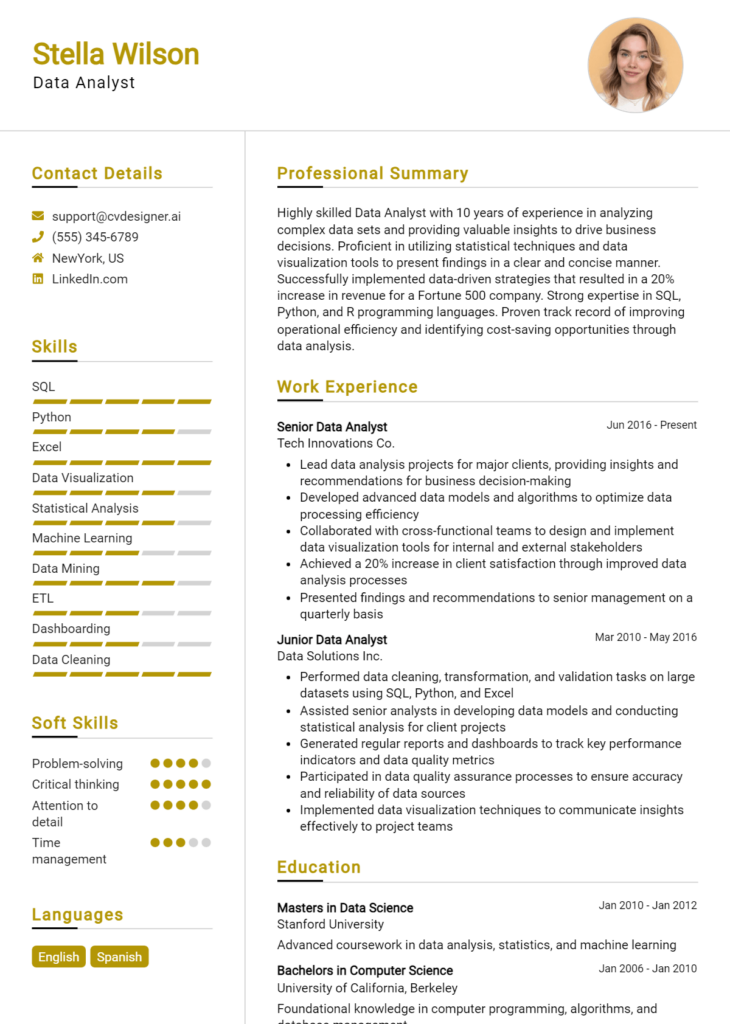Most Popular Database Administrator Resume Examples
Explore additional Database Administrator resume samples and guides and see what works for your level of experience or role.
As the backbone of any organization’s data management system, a Database Administrator (DBA) plays a crucial role in ensuring that information is stored securely, efficiently, and is easily accessible. With the increasing reliance on data-driven decision-making, the demand for skilled DBAs continues to grow. However, landing a job in this competitive field requires more than just technical expertise; it necessitates a well-crafted resume that effectively showcases your skills, accomplishments, and experience. In this article, we’ll guide you through the essential elements of creating a standout resume for a Database Administrator position, emphasizing why a polished document can make you the top contender in a job market saturated with talent.
We will cover the key responsibilities and skills that hiring managers look for in a Database Administrator, along with the most effective resume formats to highlight your qualifications. Additionally, we’ll point out common mistakes to avoid that could hinder your chances of landing an interview. To further assist you, we’ll provide resume examples tailored for various experience levels, ensuring you find a template that resonates with your career stage. Furthermore, you’ll learn valuable tips on how to enhance your resume writing skills and select the right resume templates to make a lasting impression on potential employers. Dive in to discover how to elevate your resume and position yourself as a top candidate in the field of database administration!
Key Responsibilities and Skills for a Database Administrator
A Database Administrator (DBA) plays a crucial role in managing, maintaining, and securing databases to ensure their availability and performance. The key responsibilities of a DBA include:
- Database Installation and Configuration: Setting up databases and configuring them for optimal performance.
- Database Security Management: Implementing security measures to protect sensitive data from unauthorized access or breaches.
- Performance Monitoring and Tuning: Regularly assessing database performance and making necessary adjustments to improve speed and efficiency.
- Backup and Recovery: Creating and managing backup strategies to prevent data loss and ensure quick recovery in case of failures.
- Data Migration: Overseeing the transfer of data between different systems while ensuring data integrity.
- User Management: Controlling user access and permissions to maintain data security and integrity.
- Troubleshooting: Identifying and resolving database issues, ensuring minimal disruption to operations.
- Documentation: Maintaining comprehensive documentation of database configurations, processes, and policies.
Essential skills required for a Database Administrator include:
- Proficiency in SQL and database management systems (e.g., MySQL, Oracle, SQL Server)
- Strong understanding of database design and architecture
- Knowledge of backup and recovery techniques
- Experience with performance tuning and optimization
- Familiarity with data security practices
- Problem-solving and analytical skills
- Attention to detail and organizational skills
- Ability to work under pressure and handle multiple tasks
It’s vital to highlight these skills effectively in the resume skills section. Tailoring these responsibilities and skills to align with the specific job description can significantly enhance your application’s appeal. Additionally, consider how these skills can be relevant when creating a strong CV, as they can showcase your expertise and suitability for the role.
Best Resume Format and Structure for a Database Administrator
When crafting a resume for a Database Administrator (DBA) position, it is essential to choose a format that highlights your technical expertise, experience, and skills effectively. Here’s a detailed guide on the best resume format and structure for a Database Administrator.
Contact Information
- Include your full name at the top of the resume, followed by your phone number, email address, and LinkedIn profile (if applicable).
- Make sure your email is professional and easy to read.
- Consider adding your location (city and state), but you can omit the full address for privacy.
Professional Summary
- Write a brief summary (2-4 sentences) that encapsulates your experience and key skills as a Database Administrator.
- Highlight your years of experience, areas of expertise (such as SQL, NoSQL, database design, etc.), and any notable achievements.
- Tailor this section to reflect the specific requirements of the job you are applying for.
Work Experience
- List your work experience in reverse chronological order, starting with your most recent position.
- For each role, include the job title, company name, location, and dates of employment.
- Use bullet points to detail your responsibilities and achievements, focusing on quantifiable results (e.g., “Improved database query performance by 30%”).
- Highlight specific technologies and methodologies you utilized, such as database management systems (like Oracle, SQL Server, MySQL), backup and recovery processes, and performance tuning.
Education
- Include your highest degree first, followed by the name of the institution, location, and graduation date.
- If you have relevant certifications or coursework, feel free to include that information in this section as well.
Skills
- Create a dedicated skills section where you can list both technical and soft skills.
- Focus on database technologies, programming languages, and tools (like SQL, PL/SQL, ETL processes, etc.), as well as skills such as problem-solving, communication, and teamwork.
- Customize this section to match the skills mentioned in the job description.
Certifications
- List relevant certifications that enhance your qualifications as a DBA.
- Common certifications include Microsoft Certified Database Administrator, Oracle Certified Professional, and AWS Certified Database Specialty.
- Include the certification name, issuing organization, and date obtained.
Tips for the Resume Format
- Choose a clean, professional layout with clear headings and ample white space to enhance readability.
- Use a standard font (like Arial or Times New Roman) in a size between 10-12 points.
- Keep your resume to one page if you have less than 10 years of experience; two pages are acceptable for those with more extensive backgrounds.
- Use bullet points for easy scanning and to highlight key achievements.
The format of your resume should complement the corresponding cover letter format. A well-structured cover letter should follow a similar layout, with consistent fonts and headings. It should introduce you, explain your interest in the position, and elaborate on how your experience aligns with the job requirements. This cohesion in format and tone between your resume and cover letter will present you as a polished and professional candidate.
Writing Tips and Best Practices for a Database Administrator Resume
When crafting a resume as a Database Administrator, it's essential to present your skills and experiences in a clear, concise manner that highlights your technical expertise and problem-solving abilities. Start with a strong summary that captures your professional background, and make sure to tailor your resume to the specific job you are applying for. Utilize resume writing tips to maintain a polished and professional appearance. Remember that your resume is not just a list of duties; it should reflect your achievements and the impact you've made in previous roles. Consider how these practices can also enhance your cover letter, ensuring a cohesive application package.
- Use action verbs such as “implemented,” “optimized,” and “managed” to convey your contributions effectively.
- Quantify your achievements by including metrics like improved database performance by 30% or reduced downtime by 15 hours per month.
- Incorporate industry-specific keywords relevant to database management, such as SQL, Oracle, and data security, to pass through Applicant Tracking Systems (ATS).
- Highlight relevant certifications, such as Oracle Certified Professional or Microsoft Certified Database Administrator, to demonstrate your qualifications.
- Focus on your problem-solving skills by including specific challenges you faced and how you overcame them.
- Keep your formatting consistent and professional, using bullet points for easy readability.
- Tailor each resume to the job description, aligning your skills and experiences with the specific requirements of the position.
- Proofread your resume multiple times to eliminate spelling or grammatical errors, ensuring a polished final product.
Common Mistakes to Avoid in a Database Administrator Resume
When crafting a resume for a Database Administrator position, it's crucial to avoid common pitfalls that can detract from your qualifications and experience. A well-structured resume should highlight your skills and achievements without overwhelming potential employers with unnecessary details. Here are some common mistakes to steer clear of in your Database Administrator resume:
- Overloading the resume with excessive information, making it hard to read.
- Using generic descriptions that fail to showcase specific skills or accomplishments.
- Neglecting to tailor the resume for the specific job description.
- Failing to include relevant keywords that applicant tracking systems (ATS) look for.
- Listing duties rather than quantifiable achievements, such as performance improvements or successful projects.
- Using overly technical jargon that may confuse readers unfamiliar with specific technologies.
- Ignoring formatting and layout, leading to a disorganized appearance.
- Not proofreading for grammatical errors or typos, which can undermine professionalism.
- Omitting important certifications or relevant training that enhance credibility.
To ensure your resume stands out for the right reasons, consider reviewing these common mistakes to avoid in a resume. Additionally, remember that your application package often includes a cover letter, and it's vital to avoid common cover letter mistakes to present a cohesive and professional image to potential employers.
Sample Database Administrator Resumes
As a Database Administrator (DBA), your role is pivotal in managing and securing an organization's data. This includes designing, implementing, and maintaining database systems that support business operations. Whether you are an experienced professional seeking new opportunities, an entry-level candidate looking to break into the field, or a career changer aiming to leverage your skills in a new direction, having a well-crafted resume is essential. Below are three sample resumes tailored to different levels of experience and career paths.
Experienced Professional Resume
John Doe
123 Main St, Anytown, USA
(123) 456-7890
johndoe@email.com
Professional Summary
Results-driven Database Administrator with over 8 years of experience in designing, implementing, and maintaining database systems. Proficient in SQL, Oracle, and MySQL with a strong focus on performance tuning, data integrity, and security. Proven track record in optimizing database performance and managing complex data migration projects.
Professional Experience
Senior Database Administrator
XYZ Corporation, Anytown, USA
June 2018 – Present
- Led the implementation of a new database architecture that improved data retrieval times by 30%.
- Managed a team of 3 database specialists, overseeing daily operations and performance tuning.
- Developed and enforced database security policies, reducing unauthorized access incidents by 50%.
Database Administrator
ABC Solutions, Anytown, USA
May 2015 – May 2018
- Designed and implemented backup and recovery solutions, ensuring 99.9% data availability.
- Assisted in migrating databases from on-premises to cloud solutions, enhancing scalability and reliability.
- Collaborated with application developers to optimize SQL queries, resulting in a 25% reduction in load times.
Education
Bachelor of Science in Computer Science
University of Anytown, Anytown, USA
Graduated May 2015
Certifications
- Oracle Certified Professional (OCP)
- Microsoft Certified: Azure Database Administrator Associate
Entry-Level Candidate Resume
Jane Smith
456 Elm St, Anytown, USA
(987) 654-3210
janesmith@email.com
Professional Summary
Motivated and detail-oriented recent graduate with a Bachelor’s degree in Information Technology. Enthusiastic about database management and eager to apply theoretical knowledge in a practical setting. Proficient in SQL and familiar with data modeling and database design principles.
Education
Bachelor of Science in Information Technology
University of Anytown, Anytown, USA
Graduated May 2023
Relevant Coursework
- Database Management Systems
- Data Structures and Algorithms
- Network Security
Internship Experience
Database Intern
Tech Innovations, Anytown, USA
June 2022 – August 2022
- Assisted in maintaining database systems and ensuring data integrity.
- Conducted routine database backups and participated in recovery testing.
- Collaborated with the IT team to troubleshoot and resolve database-related issues.
Skills
- SQL, MySQL, Oracle
- Data Modeling
- Problem-Solving
- Attention to Detail
Career Changer Resume
Michael Johnson
789 Oak St, Anytown, USA
(321) 654-0987
michaeljohnson@email.com
Professional Summary
Dynamic professional with 5 years of experience in project management and a passion for data analysis. Transitioning to Database Administration to leverage strong analytical skills and technical background. Experienced in managing teams and projects with a focus on data accuracy and system optimization.
Professional Experience
Project Manager
Innovative Solutions, Anytown, USA
March 2019 – Present
- Led cross-functional teams in the development of software applications, emphasizing data management and user experience.
- Analyzed project data to identify trends and improve efficiency, resulting in a 20% increase in project delivery speed.
- Developed project documentation, including data flow diagrams and system requirements.
Data Analyst
Data Insights, Anytown, USA
January 2018 – February 2019
- Conducted data analysis to support business decisions and improve operational efficiency.
- Utilized SQL to extract and manipulate data from various sources, presenting findings to stakeholders.
- Collaborated with IT to enhance database structures for better data accessibility.
Education
Bachelor of Arts in Business Administration
University of Anytown, Anytown, USA
Graduated May 2017
Skills
- SQL, Data Analysis
- Project Management
- Team Leadership
- Communication
For more inspiration, explore various resume templates tailored to different job roles and experiences. Additionally, you can enhance your job application package by reviewing corresponding cover letter examples to make a strong impression.
Checklist for a Database Administrator Resume
- Proofread for Errors: Carefully read through your resume multiple times to catch any spelling, grammar, or punctuation mistakes. Consider using tools like Grammarly for additional support.
- Check Formatting Consistency: Ensure that font styles, sizes, and colors are uniform throughout the document. Consistent formatting enhances readability and professionalism.
- Tailor to the Job Description: Customize your resume to reflect the specific skills and experiences mentioned in the job description. Highlight relevant database technologies, tools, and methodologies you've worked with.
- Include Relevant Certifications: List any relevant database certifications (e.g., Oracle, Microsoft SQL Server, MySQL) prominently to showcase your qualifications.
- Quantify Achievements: Use metrics and specific examples to demonstrate your accomplishments (e.g., "Reduced database retrieval time by 30% through optimization").
- Highlight Key Skills: Ensure that you include key database administration skills such as performance tuning, backup and recovery, and security management.
- Use Action Verbs: Start bullet points with strong action verbs (e.g., "Managed," "Designed," "Implemented") to convey your contributions effectively.
- Keep It Concise: Limit your resume to one or two pages, focusing on the most relevant experiences and skills to maintain the reader's attention.
- Seek Feedback: Have a peer or mentor review your resume for clarity, relevance, and overall presentation. Fresh eyes can catch things you might have missed.
- Consider an AI Resume Builder: To ensure all elements are well-organized and visually appealing, consider using an AI resume builder.
A similar checklist can be followed for creating a CV or cover letter.
Key Takeaways for a Database Administrator Resume Guide
In conclusion, crafting a strong resume as a Database Administrator is crucial for standing out in a competitive job market. By utilizing the examples and tips provided, you can effectively showcase your skills, experiences, and achievements to potential employers. We encourage you to take the next steps by downloading a customizable template from resume templates or exploring our cover letter templates to complement your application. Additionally, consider using our intuitive resume maker to create a polished and professional resume with ease. Remember, following these guidelines will not only enhance your resume but also assist you in developing a compelling CV and an impactful cover letter. Start your journey towards landing your dream job today!
